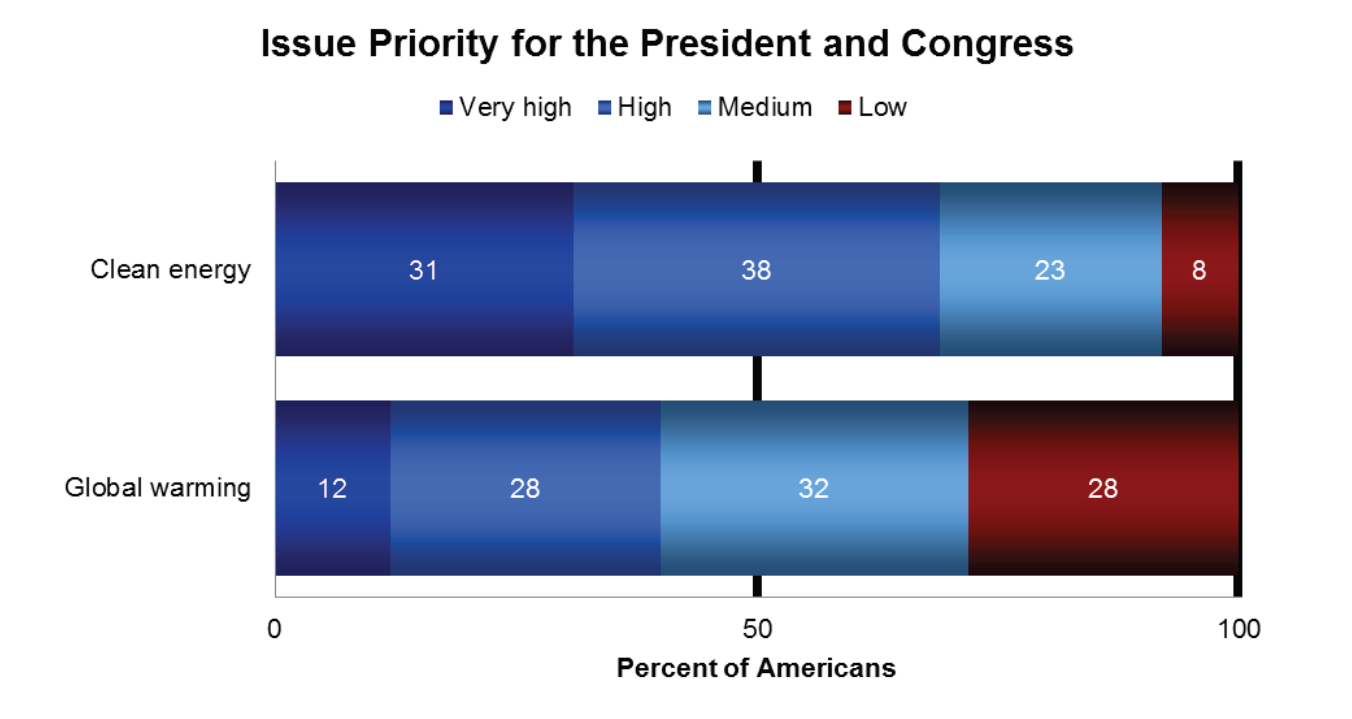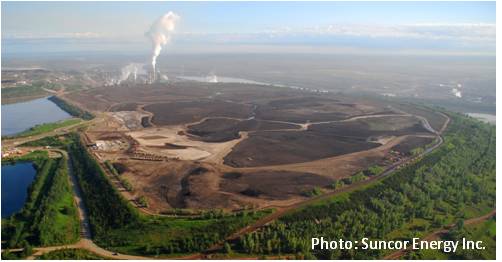121 item(s) were returned.
On April 26th, the Yale Project on Climate Change Communication and the George Mason University Center for Climate Change Communication released the results of a recent poll, suggesting that “overall, majorities of Americans say that global warming and clean energy should be among the nation’s priorities… and support a variety of climate change and energy policies.” The survey of 1,008 American adults found that: “92 percent of Americans think that developing sources of clean energy should be a very high (31%), high (38%), or medium (23%) priority for the president and Congress.” “91 percent of Democrats, 77 percent of Independents,… [more]
View InsightA recent op-ed by noted academic Bjorn Lomborg questions the idea that renewable energy – wind, in particular – is up to the task of mitigating climate change. Renewables are not cost-competitive with traditional energy sources, he argues; and because renewables are intermittent and must be backed-up by base-load or peaker power plants, their true costs per kWh is often understated and their CO2 reduction potential overstated. Much of Lomborg’s argument focuses on the UK’s plan for a 20% reduction in CO2 by 2020 that, according to the op-ed, would require that wind account for 31% of the country’s electricity… [more]
View InsightA recent report from the Bipartisan Policy Center, Energy Innovation at the Department of Defense: Assessing the Opportunities, challenges the assumption that the DoD can function as a be-all-end-all driver of U.S. energy. From the report: “DoD’s historical record on energy innovation is extraordinary, and there is reason to hope that important advances might come from a renewed effort in this area. But there also appear at present to be significant limitations upon the scope and scale of DoD’s likely influence on technological advance that can contribute to the nation’s energy infrastructure as a whole, and particularly to the development… [more]
View InsightOn March 27, 2012 the Environmental Protection Agency, under the authority of the Clean Air Act, released proposed greenhouse gas standards for newly constructed power plants. The rules would require that “new fossil‐fuel‐fired power plants meet an output‐based standard of 1,000 pounds of CO2 per megawatt‐hour (lb CO2/MWh gross).” Combined-cycle natural gas plants should be able to meet this requirement, and coal- or petroleum coke-fired plants would be able to with emerging technologies such as carbon capture and storage. The proposed rules elicited varied response from advocacy groups, many of which were highlighted in this Los Angeles Times article. Environmental… [more]
View InsightIn a study of U.S. carbon capture and storage (CCS) potential published in the Proceedings of the National Academies of Science, researchers at the Massachusetts Institute of Technology found “that the United States can store enough CO2 to stabilize emissions at their current rate for over a hundred years. This result suggests that with a favorable political and economic framework, carbon capture and storage can be a viable climate change mitigation option in this country for the next century.” The video below explains their findings:
View InsightA study of successful cap-and-trade schemes published in the Proceedings of the National Academies of Science found that cap-and-trade policies – a widely favored tool in climate change mitigation – do not necessarily provide sufficient incentives for firms to innovative environmentally-preferable processes and technologies. This finding is significant, as a central argument in favor of cap-and-trade schemes is that they provide price signals that lead firms toward innovation. The study’s author, Margaret Taylor, a researcher at Lawrence Berkeley National Laboratory, notes that compliance costs are frequently overestimated by firms and policymakers during the cap-and-trade schemes’ formulation. Because of this, capped… [more]
View InsightIn a response to a New York Times ‘Room for Debate’ forum on energy efficiency, Cato Institute scholar Peter Van Doren argues that energy efficiency standards are problematic, and that the most effective way to reduce fossil fuel use is to tax fossil fuels to increase their price. Van Doren writes “if fossil fuel combustion produces byproducts that cause negative health effects on third parties as well as changes in the temperature of the atmosphere, the obvious lesson from economics is to increase fossil fuel prices enough through taxation to account for these effects. Then firms and consumers will react… [more]
View InsightLast week The Economist called attention to growing demand for rare earth minerals, their importance in clean energy technologies, and rising tension over their global supply. Two of these minerals – dysprosium and neodymium – are essential components of the magnets used in wind turbines and electric motors. According to The Economist, for these technologies to play the role expected of them in reducing CO2 emissions, world supply of neodymium and dysprosium would need to increase “more than 700% and 2,600% respectively during the next 25 years.” China, which produces around 90% of the world’s rare earth minerals, has recently… [more]
View InsightA paper by researchers at the University of Alberta, Edmonton found that the impact of Canadian oil sands mining, and subsequent land restoration, on carbon release has been significantly underestimated. This is due to the mining process’s destruction of peatland – bogs, swamps, etc. that host partially decayed organic matter – which, when destroyed, releases high levels of carbon. From the paper’s abstract in the Proceedings of the National Academies of Science: “We quantified the wholesale transformation of the boreal landscape by open-pit oil sands mining in Alberta, Canada to evaluate its effect on carbon storage and sequestration. Contrary to… [more]
View InsightSenate Energy & Natural Resources Chairman Jeff Bingaman (D-NM) has introduced the Clean Energy Standard Act of 2012, which would require electric utilities to derive increasing percentages of their supply mix from low-CO2 sources. The bill would take effect in 2015, and would require that by 2035 84% of power from large utilities come from low-CO2 sources. Sources eligible under the legislation include: renewables, such as wind and solar, “qualified” renewable biomass and waste-to-energy, hydropower, natural gas, and nuclear. Facilities with CO2 capture and storage, and some combined heat and power facilities, are also eligible. The bill establishes a market-based… [more]
View Insight
